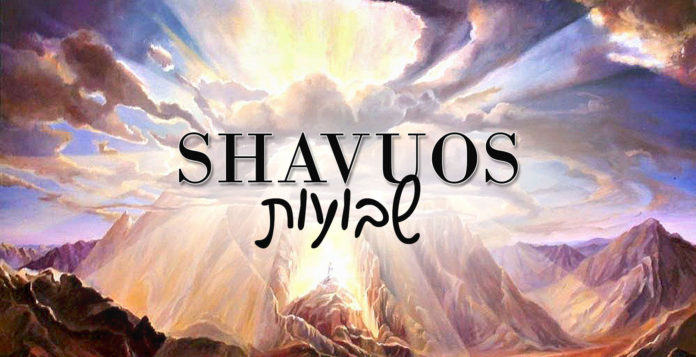It is strange that we all know of Shavuos as the זמן מתן תורתינו, and we even say so in our tefillos, and yet there is nowhere in the Torah that commemorates this chag as the day we received the Torah. In Parshas Emor the parsha discusses the different aspects of every chag and it conspicuously leaves out the “real” reason for celebrating Shavuos, instead referring to it as just the 50th day after a forty nine day counting cycle since we brought the Korban Omer. In and of itself, that isn’t so crazy. Rosh Hashana is not known as the יום הדין anywhere in the Torah, Yom Kippur is not known as the יום החתימה, and there are many times where the Torah is cryptic regarding the מצות היום, relying on תורה שבעל פה to give us all the information we need.
Shavuos, however, is different for another reason. Shavuos has a special הקרבה known as the שתי הלחם which allows everyone to bring חדש into the Bais Hamikdash and use it as מנחות for the very first time: והקרבתם מנחה חדשה לה’. This is the only chag in which we go into some detail about the הקרבות of the day in Parshas Emor. There is a general mention about the “fire-offerings” of Pesach, the ימי הדין, and Sukkos, but nothing more than that (their details are mentioned in Parshas Pinchas). By Shavuos we mention not only the special שתי הלחם of the day, but also the bulls, rams, sheep, and goats that are brought with it. Something is odd here.
Kli Yakar points out that although there is no pasuk that says explicitly we received the Torah on Shavuos, there is a רמז here from the pasuk about the שתי הלחם. The Torah calls this a מנחה חדשה, which seems to mean a special “new” gift that we received that we then give over to Hashem. If we would tell you Shavuos is the day we received the Torah and therefore we should learn even more Torah on this day, that would indicate that this day is more special than any other when it comes to learning. This cannot be true! Every day we should work hard to make sure our Torah is a מנחה חדשה, as if we received the Torah on this very day! There are many מאמרי חז”ל that corroborate this idea, such as Brachos סג:, which says ללמדך שחביבה תורה על לומדיה בכל יום ויום כיום שנתנה מהר סיני.
The Torah, he continues, should be like a child feeding from his mother. In Eiruvin נד: the Gemara tells us that every time a child suckles from his mother he tastes something new, and this should be compared to a person learning Torah who every day finds something new and exciting!
This is why we can never “limit” the Torah to a certain day and we don’t mention this reason as the purpose of the holiday of Shavuos. It should be as if every single day is מתן תורה, and therefore even if we did receive the Torah on this day, that should not be the reason for the celebration at all.
On the other hand, it seems that Shavuos isn’t really the day of מתן תורה after all. The Gemara in Shabbos פז through פט discusses when the Luchos were actually given – on the 6th or 7th of Sivan. If the whole purpose of Shavuos is to commemorate our receiving the Torah which may have been given on the 7th, then people keeping only one day of Yontif in Eretz Yisroel would be keeping the wrong day of Yontif!
Rav Shimshon Refoel Hirsh says that it seems that Shavuos is not a chag about something that happened in the past, but a current progressive movement to achieve our aspirations. We count up to show our desire to move forward. The ultimate goal, of course, is to eventually receive the Torah, but this is the preparation period to become worthy of receiving it. We are not commemorating the reception; we are exhibiting our readiness for it! He suggests that this is the reason why this Chag is called something that has nothing to do with the mitzvos of the holiday (unlike Pesach and Sukkos), because the chag is not about the mitzvos of the holiday, but rather about the preparations that lead to it.
For that reason, the 50th day is a culmination of all of our hard work – we are not ready to receive! Shavuos is the day we were “ready” and “willing” to receive the Torah, not the day we actually received it. This should happen every year, allowing us to prepare ourselves anew and prepare ourselves again and again for G-d’s holy word.
This is especially true when we look up the halachos of Shavuos in the Shulchan Aruch (specifically סימן תצד). It is clear that the 50th day of the Omer does not have to be the same day every year, and when we used to be מקדש the month through Bais Din, it was likely it would not be the same day from year to year. It could be on the 5th, 6th, or 7th day of Sivan! Seeing that the Torah does not designate a certain day for Shavuos lends credence to this idea that the day of Shavuos is not about Mattan Torah, but about preparing for Mattan Torah. It is about the counting, not about a זכר.







